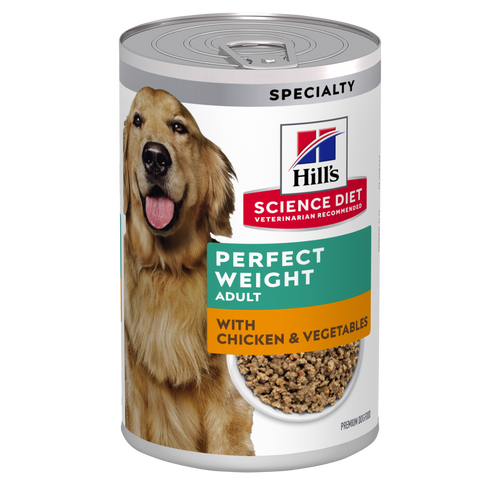
-
Find the right food for your petTake this quiz to see which food may be the best for your furry friend.Find the right food for your petTake this quiz to see which food may be the best for your furry friend.Health CategoryFeatured products
 Adult Perfect Weight & Joint Support Chicken & Brown Rice Recipe Dog Food
Adult Perfect Weight & Joint Support Chicken & Brown Rice Recipe Dog FoodThis weight management and mobility support dog food was created with Hill’s unique understanding of the biology of overweight dogs.
Shop Now Healthy Mobility Large Breed Chicken Meal, Barley & Brown Rice Recipe Dog Food
Healthy Mobility Large Breed Chicken Meal, Barley & Brown Rice Recipe Dog FoodAdvanced nutrition shown to support joint health and improve mobility
Shop Now Adult 6+ Large Breed Chicken Meal, Barley & Rice Recipe Dog Food
Adult 6+ Large Breed Chicken Meal, Barley & Rice Recipe Dog FoodSupports energy level, joint health, and beautiful coat in large breed mature dogs
Shop NowFeatured products Adult Perfect Weight Salmon & Vegetable
Adult Perfect Weight Salmon & VegetableOver 70% of cats lost weight within 10 weeks when fed this nutrition
Shop Now Adult Indoor Savory Chicken Entrée Cat Food
Adult Indoor Savory Chicken Entrée Cat FoodPrecisely balanced nutrition for indoor cats with the delicious taste of savory minced chicken
Shop Now Kitten with Salmon
Kitten with SalmonPrecisely balanced nutrition with the delicious taste of minced salmon to help build immunity and a healthy digestive system
Shop Now -
DogCat
- Cat Tips & Articles
-
Health Category
- Weight
- Skin & Food Sensitivities
- Urinary
- Digestive
- Kidney
- Dental
- Serious Illness
-
Life Stage
- Kitten Nutrition
- Adult Nutrition
Featured articles Water
WaterWater is the most important nutrient of all and essential for life. Animals can lose almost all their fat and half their protein and still survive, but if they lose 15% of their water, it will mean death.
Read More The Right Diet For Your Pet
The Right Diet For Your PetLearn what to look for in healthy pet food & nutrition, including ingredients, quality of the manufacturer, your pet's age, and any special needs they have.
Read More Pet Food Storage Tips
Pet Food Storage TipsWhere you store your cat and dog food can make a big difference in the quality and freshness once it is opened. Here are some common questions and recommendations for optimal storage for all of Hill’s dry and canned cat and dog food.
Read More -


When you called your neighbor this afternoon to see if she'd like to take a walk over to the dog park — with both of your pets, of course — you were shocked to learn that both your friend and her dog wouldn't be able to attend. She just returned home from the veterinarian's office after learning that her dog has heartworms, and she wanted him to relax and recuperate.
Now, you've heard the term, but you're not quite sure what happens with heartworms in dogs. Will her dog be alright? Could her pet have infected yours?
What Are Heartworms in Dogs?
Heartworm disease is a serious condition in which a parasite called Dirofilaria immitis takes up residence in your dog's body, specifically in his heart, lungs and associated blood vessels. This condition is serious as it can cause heart failure, lung disease and possibly even death, while also exacerbating other conditions.
Are you wondering if heartworms are in fact actual worms that are living in your dog's body? Well, yes. As gross as that may sound, these parasites develop from larvae into adult worms. According to the U.S. Food and Drug Administration (FDA), they can live for five to seven years in your dog's body, and grow four to six inches long in males and ten to twelve inches in females. Take a second to digest that information!
How Can Your Dog Get Heartworms?
Heartworm disease is spread when an infected mosquito bites a dog, leaving behind microfilariae, which then become larvae and mature into adult heartworms. After mating with a male heartworm, the adult female discharges offspring into the dog's bloodstream, continuing the life cycle yet again.
The good news is that infected dogs are not contagious (so, your friend and her pet could have gone to the dog park with you!). An infected dog cannot get any other dogs sick just by being around them. The other dogs would need to get bit by an infected mosquito to contract heartworm disease themselves.


Tasty Tips
Look Out for These Heartworm Symptoms
According to the FDA, there are four stages of heartworm disease, and symptoms appear differently in each stage. In Class 1, you may not notice any symptoms, and if you do, it would only be a light cough. Class 2 is when symptoms start to appear. You might notice that your dog is more fatigued after being active or you may notice an occasional cough. Class 3 symptoms will be more obvious and include a persistent cough. Your dog will also tire after just light activity. You may also notice some trouble breathing with a Class 3 diagnosis.
Finally, there's Class 4, also known as caval syndrome. This occurs when there are so many worms that they block the blood flow back to your dog's heart, and it requires immediate surgery. Class 4 disease is fatal if untreated. Not all dogs with heartworm disease develop into this stage, but it's important to identify what class a dog may be experiencing so that it doesn't potentially develop into the worst-case scenario.
If you're ever concerned that your dog is experiencing any heartworm symptoms, it's important to make an appointment right away with your pet's veterinarian. The vet will draw blood to check for the presence of a heartworm infection in your dog. If your dog is infected, he or she can then recommend medicine or surgery for treatment, depending on how ill your dog is.
How Can You Prevent Heartworms?
The good news is that there are medications your dog can take to prevent heartworm infection. Your vet can prescribe a topical agent or oral pill to be taken every month. It's important to work all year long to prevent heartworms (even if there are no mosquitoes flying by in the winter), so try not to miss a dose to keep your dog safe and healthy. With diligent prevention, you may never even have to worry, but it's always smart to be on alert for any health changes in your pets. For more information regarding heartworms you can visit the Heartworm Society website. Also, be sure to talk to your vet at your pup's next checkup about heartworm testing and prevention to ensure your pup stays as healthy as possible.


Erin Ollila believes in the power of words and how a message can inform—and even transform—its intended audience. Her writing can be found all over the internet and in print, and includes interviews, ghostwriting, blog posts, and creative nonfiction. Erin is a geek for SEO and all things social media. She graduated from Fairfield University with an M.F.A. in Creative Writing. Reach out to her on Twitter @ReinventingErin or learn more about her at http://erinollila.com.
Related products

Advanced nutrition shown to support joint health and improve mobility

Over 70% of dogs lost weight within 10 weeks when fed this nutrition

This weight management and mobility support dog food was created with Hill’s unique understanding of the biology of overweight dogs.

Supports energy level, joint health, and beautiful coat in large breed mature dogs
Related articles

Learn what you can feed your pregnant or nursing dog to keep her and her new pups healthy.

A dog with a sensitive stomach has special needs. Learn more about sensitive stomach symptoms in your dog, what you can do to help sooth your pet’s insides and get recommendations on sensitive stomach dog food.

Selecting the right food for your puppy is a key to quality nutrition and a long, healthy life., Learn more about how to select the right puppy food.

Though it may seem like your four-legged friend loves nothing more than to nap on the couch, dogs need regular exercise to stay healthy just like people do.

Put your dog on a diet without them knowing
Our low calorie formula helps you control your dog's weight. It's packed with high-quality protein for building lean muscles, and made with purposeful ingredients for a flavorful, nutritious meal. Clinically proven antioxidants, Vitamin C+E, help promote a healthy immune system.
Put your dog on a diet without them knowing
Our low calorie formula helps you control your dog's weight. It's packed with high-quality protein for building lean muscles, and made with purposeful ingredients for a flavorful, nutritious meal. Clinically proven antioxidants, Vitamin C+E, help promote a healthy immune system.

